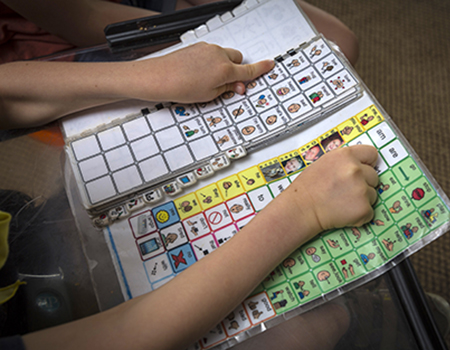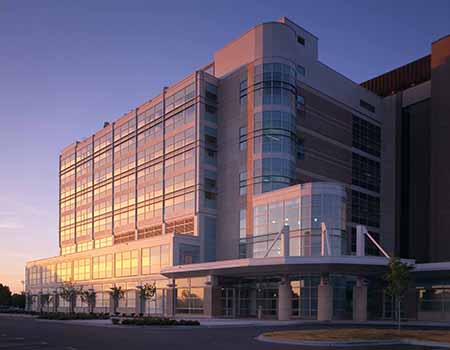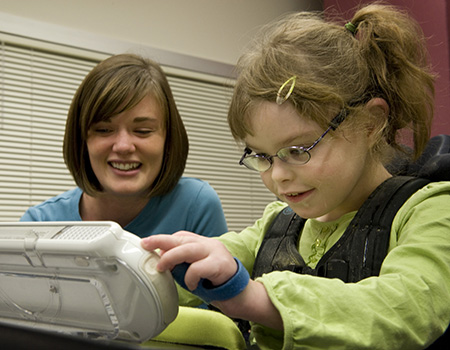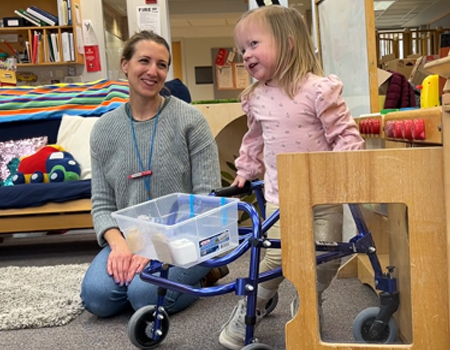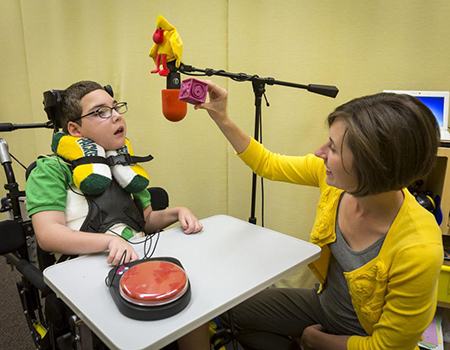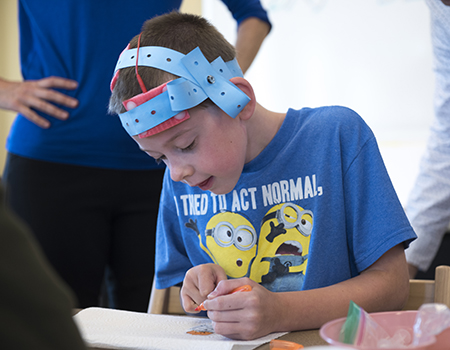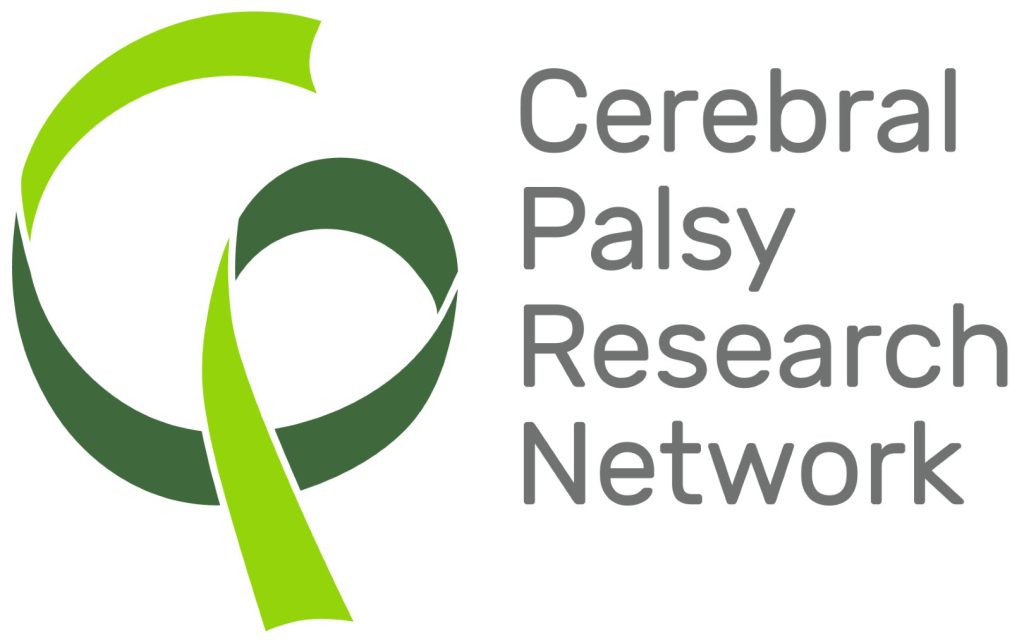The Waisman Center is committed to providing high-quality services to children with cerebral palsy and their families. CP is the most common cause of severe motor disability in children. Up to one-half of children with CP may have a co-occurring intellectual disability. Research suggests that 60 percent of children with CP have communication problems, yet many do not receive appropriate interventions until they experience significant communication challenges.

The Waisman Center is committed to providing high-quality services to children with cerebral palsy and their families. CP is the most common cause of severe motor disability in children. Up to one-half of children with CP may have a co-occurring intellectual disability. Research suggests that 60 percent of children with CP have communication problems, yet many do not receive appropriate interventions until they experience significant communication challenges.
Clinics
Cerebral Palsy Clinic
The Waisman Center Cerebral Palsy Clinic is an interdisciplinary team of professionals addresses the complex needs of children up to 21 years of age with cerebral palsy (CP) and other neurological conditions that affect motor development.
CASC - Augmentative Communication Aids & Systems Clinic
The CASC team’s speech-language pathologists and occupational therapists partner with families to provide highly specialized, cutting-edge augmentative and alternative communication (AAC) for children and adults experiencing significant communication difficulties.
Neuromotor Development Clinic
The Waisman Center Neuromotor Development Clinic is an interdisciplinary team of professionals works together to evaluate the needs of young children (generally under three years of age) with motor disability including early cerebral palsy and other neurological conditions that affect motor development.
Outreach
UCEDD
The mission of the Waisman Center, University Center for Excellence in Developmental Disabilities (UCEDD) is to support the full inclusion and self determination of people with developmental disabilities and their families. Autism is a major area of focus.
Cerebral Palsy Day with the Experts
Learn about the latest advances in cerebral palsy research and clinical services and hear from a panel of experts-individuals with cerebral palsy and family members. Visit the archives page to view past presentations and download handouts.
Children's Resource Center-South
Guiding Wisconsin families of children and youth with special health care needs. We are parents and professionals who can help get answers, find services, connect you to community resources, provide trainings, and support you on your journey.
CP Specific Resources
Play Activities for Cerebral Palsy
Different ways to support your child's gross motor activities.
Research Activities
Epidemiology of Cerebral Palsy
WISADDS is a multi-source public health surveillance project that monitors the prevalence of autism spectrums disorders (ASDs), cerebral palsy (CP), and co-occurring intellectual disability (ID) in 8-year-old children within a 10-county area in southeastern Wisconsin.
Wisconsin Intelligibility, Speech, and Communication Laboratory
Katherine C. Hustad, PhD, leads several longitudinal studies focused on communication development in children with CP. These studies aim to characterize changes in speech and language abilities from infancy through adolescence in this heterogeneous population.
Pediatric Neuromodulation Lab
The lab's current studies focus on infants and children with early brain injury and resultant diagnosis of cerebral palsy. Specifically, we investigate how the brain recovers and develops after early injury, and the development of new interventions with rehabilitation to optimize lifelong outcomes.
Cerebral Palsy News & Studies Recruiting
Cerebral Palsy News

Atypical infant movements tied to cerebral palsy may signal differences in brain connectivity
Brain connectivity differences linked to atypical infant movements may aid the early prediction of cerebral palsy development after a perinatal brain injury, a new Waisman Center study shows.
August 15, 2025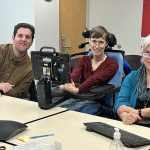
Wisconsin LEND trainees visit state legislators to share their personal stories and educate about the impact of Medicaid on Wisconsinites with disabilities
The Wisconsin LEND Program prepares individuals with disabilities to engage in policy discussions, giving them the tools and confidence to make their voices heard.
July 15, 2025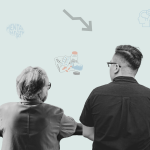
Health trajectory of mothers of children with developmental disabilities shows a ‘wear-and-tear’ effect starting around age 65
Mothers of children with developmental disabilities experience long-term stress, adapting for many years but showing signs of ‘wear-and-tear’ starting around age 65, affecting their physical and mental health.
June 5, 2025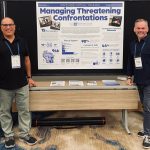
Statewide success: Managing threatening confrontations training enhances disability support for thousands
It focuses on teaching proactive and positive strategies for supporting individuals with disabilities through a broad range of behaviors and escalation levels.
April 8, 2025
Improved assessment protocols identify cerebral palsy earlier
Research from the Pediatric Neuromodulation Lab of Bernadette Gillick, PhD, MSPT, PT, at the Waisman Center showcases that evidence-based assessments for cerebral palsy (CP) are helping to improve diagnostic timelines and access to therapies and interventions.
March 26, 2025- More Cerebral Palsy posts
Community Partners
Cerebral Palsy-Related Studies Recruiting
Resources & Services
Resources & Services
 Research Participation | 800.965.9205; 608.263.5192; registry@waisman.wisc.edu; Participate in Research
Research Participation | 800.965.9205; 608.263.5192; registry@waisman.wisc.edu; Participate in Research
The Waisman Center’s Research Registry links individuals and families to research projects at the Waisman Center. The Waisman Center maintains a confidential registry of families and individuals who would like to be contacted about upcoming research projects. Enrollment in the Research Registry does not obligate an individual or family to participate in any study.
 Community Outreach for Children with Challenging Behaviors | 608-265-9438; cow.waisman.wisc.edu/ties
Community Outreach for Children with Challenging Behaviors | 608-265-9438; cow.waisman.wisc.edu/ties
Community Training, Intervention and Evaluations Services (TIES) is an outreach program for children and adults with developmental disabilities who present various challenging behaviors, including withdrawal, aggression and self-injury. The mission of Community TIES is to address behavioral, psychological, and emotional needs using therapeutic approaches that insure continued participation in the community. TIES provides counseling, crisis response, psychiatric consultation, parent education and support, and training for personnel and program consultation in local human service agencies. Directed by Josh Lapin, MSW, and funded by Dane County, this program maintains an active caseload of approximately 250 children and adults in Dane County.
 Finding Your Way: Videos for Families | wicii.waisman.wisc.edu/training/fyw-videos/
Finding Your Way: Videos for Families | wicii.waisman.wisc.edu/training/fyw-videos/
Finding Your Way is a video series for families and caregivers of children with intellectual and developmental disabilities. The videos provide information on services and resources for children with disabilities in Wisconsin. Topics include the Birth to Three Program, Children's Long-Term Supports Program (CLTS)/Children's Community Options Program (CCOP), Early Childhood Special Education, Head Start/Early Head Start, Home Visiting Programs, Katie Beckett Medicaid, Outpatient Therapy, and Supplemental Security Income (SSI).
 Moving to Adult Health Care: A 6-Part Toolkit Series for Health Care Transition | https://movingtoadulthealthcare.org/toolkits/
Moving to Adult Health Care: A 6-Part Toolkit Series for Health Care Transition | https://movingtoadulthealthcare.org/toolkits/
These toolkits aim to help you learn and get ready for moving to adult health care and living a healthy adult life. They will give you lots of information and resources to help you during this time of transition. Each toolkit will focus on a different topic about health care transition.
 Wisconsin Wayfinder: Essential Children's Resources | 877-947-2929; dhs.wisconsin.gov/wiscway/
Wisconsin Wayfinder: Essential Children's Resources | 877-947-2929; dhs.wisconsin.gov/wiscway/
Wisconsin Wayfinder supports families of children with delays, disabilities, special health care needs, and mental health conditions. Children’s resource guides are helpers who assist families, caregivers, professionals, and organizations in finding a wide array of supports and services available through the Children’s Resource Network. Their services are free and confidential. Connect with a children's resource guide. Call (877) WiscWay or use our contact form.
 Well Badger Resource Center | 800-642-7837; text: 608-360-9328; help@wellbadger.org; https://www.wellbadger.org/
Well Badger Resource Center | 800-642-7837; text: 608-360-9328; help@wellbadger.org; https://www.wellbadger.org/
When you have questions about health and social services, figuring out where to go when you need help can be overwhelming. We’re here to make it easier. Well Badger Resource Center is your one-stop connection to community, social, health, and government programs — a place to find what you need, when you need it.


